Cargando...
Recursos educativos
-
Nivel educativo
-
Competencias
-
Tipología
-
Idioma
-
Tipo de medio
-
Tipo de actividad
-
Destinatarios
-
Tipo de audiencia
-
Creador
Lo más buscado
- Relieve de Europa
- Verbo y predicado
- Letras Q
- Palabras con hie
- O aberta O tancada
- Contaminación acustica
- Arte prerrománico
- Ejercicios escolares para niños de 7 años
- Descargar ejercicios de música para niños
- Arte abstracto
- Psicología infantil
- Actividades musicales
- Razonamiento verbal
- Experimentos matemáticos fáciles
- Cultura y lenguas clásicas
-

-

True/false. The Earth's population
EduBook Organización
- 7215 visitas
Are the following statements true or false?: Population refers to the total number of people who live in a particular area; the study of population is called demography. Demography also affects changes…
-

End-of-unit activities - Agriculture, livestock and fishing
EduBook Organización
- 7101 visitas
The primary sector includes activities such as agriculture, livestock farming and fishing. In MEDCs (more economically developed countries), commercial agriculture (making products to sell) is common…
-

Introduction - Agriculture, livestock and fishing
EduBook Organización
- 6882 visitas
The primary sector includes activities such as agriculture, livestock farming and fishing. In MEDCs (more economically developed countries), commercial agriculture (making products to sell) is common…
-

End-of-unit evaluation - Agriculture, livestock and fishing
EduBook Organización
- 6875 visitas
The primary sector includes activities such as agriculture, livestock farming and fishing. In MEDCs (more economically developed countries), commercial agriculture (making products to sell) is common…
-

Answer. Inequalities in the global population
EduBook Organización
- 5277 visitas
Answer the following questions: Is today's global population growing at the same rate as in the 20th century? Why or why not? What is the main characteristic of the evolution of population in…
-

Answer. Demographic inequalities
EduBook Organización
- 5246 visitas
Review what you have studied and do the following activities: What are the general characteristics of the evolution of the global population? Explain which demographic inequalities exist between wealthy…
-

Unit 11: Towards a global system
EduBook Organización
- 4537 visitas
Brain drain (n): a situation in which the most skilled workers in less economically developed countries (LEDCs) go to work in more economically developed countries (MEDCs). chain (n): a number of…
-

Absolute monarchy in Europe
EduBook Organización
- 4311 visitas
2.1. Political and Religious Changes The Peace of Westphalia ended the Thirty Years' War (1618-1648) between Catholics and Protestants. It confirmed religious freedom for individual states and…
-

Decolonisation
EduBook Organización
- 4125 visitas
After the Second World War, many Asian and African countries under European control became independent. Some signed agreements with the colonising countries, while others only gained independence after…
Te estamos redirigiendo a la ficha del libro...













